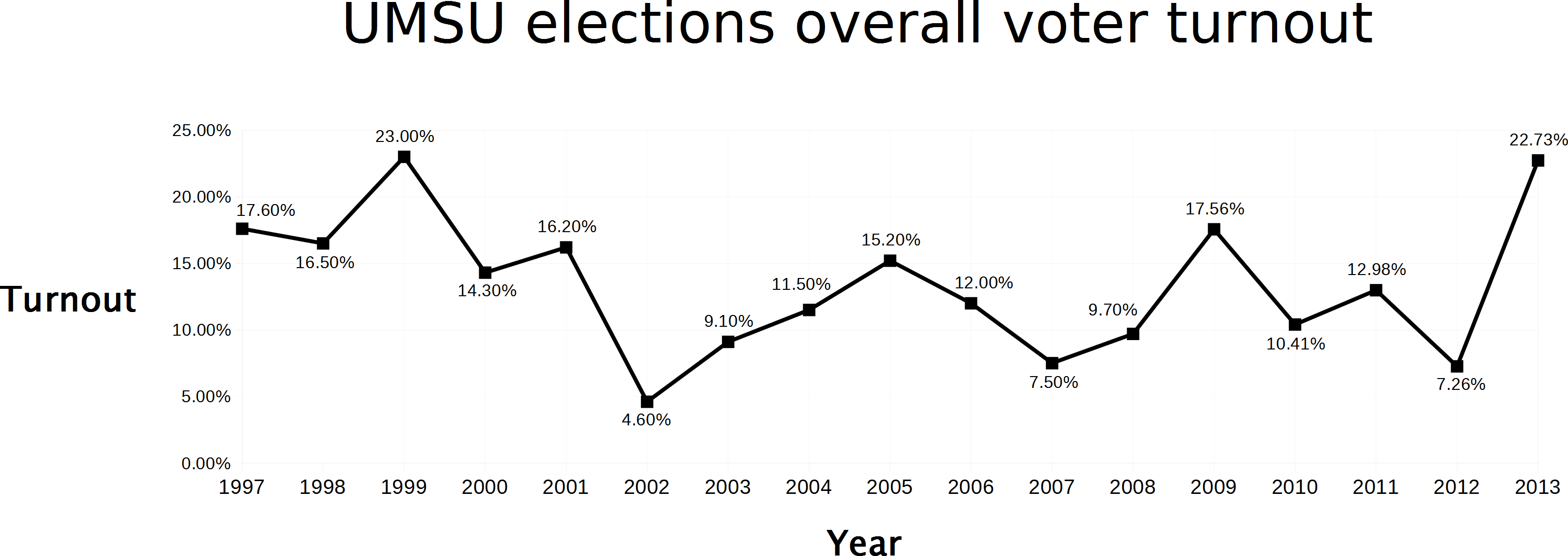What is your vote worth in the UMSU election? Is it worth voting at all?
The answer to the former is crucial to addressing the latter. After all, as every student knows, time is precious while many of the issues dealt with by the elected representatives of U of M students bear an, at best, specious relationship to the daily activities of individual members of the union.
Voter turnout amongst young people is historically depressed, and a depressing concept to contemplate. After the 2011 federal elections, Marc Mayrand, chief electoral officer of Canada, noted that though the low turnouts of recent elections are disturbing (58.8 per cent of registered voters in 2008, 61.1 per cent in 2011) the “decline is disproportionately concentrated among the youngest electors.”
Explanations for this tendency abound. According to a survey conducted by Elections Canada, many do not vote because of a dearth of knowledge about the candidates vying for position. When one knows nothing about any of the possible choices, all of the choices are equal. This is not a situation where returns on the investment of time are likely to motivate.
It seems probable that the students at a university would buck this trend. The purpose of an education is so often touted as learning how to learn. Are UMSU members not among the most likely group of young people to have both a thirst for knowledge and the know-how to dissect pertinent information?
Apparently not. The most prominent fact illustrated by the graph charting the UMSU voting trends over the last 17 years is that there has not been a single election or referendum where a quarter of eligible voters cast a ballot. Some may see the lack of participation in democracy on this local level, where the effects of elections are most prominent in the lives of the deciders, as a travesty. That is a valid and defensible perspective. Another is that the facts presented here suggest an opportunity for members of the union.
UMSU financial records for September indicate that the total revenues in the yearly budget were expected to be $1,173,850.35. If we look at the voting records, we see that 6,178 votes were cast last year.
It is reasonable to assert that many factors, besides the will of voters, go into the expenditures of UMSU. It is just as reasonable to assert that UMSU’s influence extends beyond their power over the budget. It is plausible to call these factors a wash.
A similar conclusion can be reached about the assertion that funding is locked in by tradition and long-term contract; each year’s executive’s influence will extend into the future. Once again we can take the result as a wash.
Each vote last year was approximately equivalent to allocating $190 worth of spending.
Take 20 minutes out of your busy schedules to read this week’s issue of the Manitoban, email a question to a candidate, or find some other method of informing yourself. Allow yourself a generous 10 minutes to cast a vote. You will be exerting influence at a rate of $380 per hour.
I won’t pretend to know the median wage of University of Manitoba students. I am nonetheless comfortable asserting that voting is a worthwhile proposition for all but a few.


